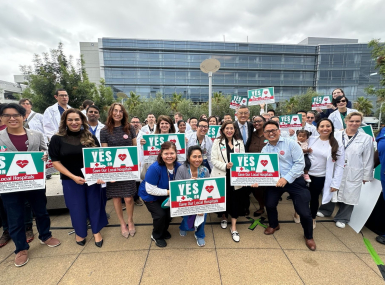Relief for opioid crisis takes shape in Congress
Upcoming Events
Related News

Key Takeaways
Congress is expected to continue working this summer toward an opioid legislative package following a flurry of action around the issue on Capitol Hill during May and June. The opioid epidemic has figured as a prominent issue for legislators over the past several months, and committees in the House and Senate have considered numerous proposals that aim to curb the sharp rise in opioid overdoses and deaths across the country.
Of the more than 60 opioid measures introduced for consideration in the House, legislators recently passed 38 individual bills, most of which are bipartisan and narrow in scope. The bills propose an array of federal policy actions to address the crisis, including tweaks to Medicaid and Medicare that could expand treatment options, as well as the creation of education and technical assistance programs for health care providers treating patients with substance use disorders.
House members plan to use the remainder of the June legislative session to vote on additional bills, with the goal of sending a comprehensive package to the Senate. On June 13, Energy and Commerce Committee leadership introduced legislation, titled the Substance Use-Disorder Prevention that Promotes Opioid Recovery and Support (SUPPORT) for Patients and Communities Act (H.R. 6), that will serve as the underlying vehicle to move most of the approved House bills forward as a package.
As part of the Senate’s broader efforts around the opioid crisis, the Health, Education, Labor and Pensions (HELP) Committee in May advanced the Opioid Crisis Response Act (S. 2680), a single, but wide-ranging bill that includes measures intended to expand patients’ access to medication-assisted treatment and train first responders to administer overdose antidote drugs.
Other Senate committees have also approved proposals that could be combined with S. 2680 into a broader set of bills. In June, the Senate Finance Committee passed the Helping to End Addiction and Lessen (HEAL) Substance Use Disorders Act and the Judiciary Committee advanced five pieces of legislation that focus on the public safety and law enforcement aspects of the epidemic.
Proposals could impact local response to opioid crisis
Several bills underway in Congress could impact the local response to the opioid epidemic if enacted. NACo is closely tracking the progress of each bill.
Two of these bills are now slated for a floor vote in the House and focus on expanding Medicaid treatment options for justice-involved individuals. One such bill is the At-Risk Youth Medicaid Protection Act (H.R. 1925), which would streamline the delivery of addiction treatment services for juveniles released from county correctional facilities. This measure could help counties provide effective treatment and care coordination services pre- and post-release, allowing smoother transitions to community care for justice-involved youth.
NACo supported another House bill, the Medicaid Reentry Act (H.R. 4005), which would direct the Department of Health and Human Services (HHS) to issue best practices around providing health care for justice-involved individuals returning to their communities from county correctional facilities.
Two other NACo-supported measures focus on better coordinating care for individuals with substance use disorders. One of these bills, the Overdose Prevention and Patient Safety Act (H.R. 6082), would allow for information-sharing between behavioral health and other health providers treating addiction, a long-standing NACo priority.
The other bill, the Improving Access to Behavioral Health Information Technology Act (S. 1732/H.R. 3331), would direct the Centers for Medicare and Medicaid Innovation to incentivize health information technology demonstrations for behavioral health providers, including approximately 750 county-based behavioral health authorities. This measure could support the integration of health information into local care delivery systems.
In the Senate, NACo endorsed the Comprehensive Addiction Resources Emergency (CARE) Act (S. 2700/H.R. 5545), which would make direct investments in state and local agencies operating on the frontlines of the epidemic, including emergency first responders, public health departments and regional epidemiology centers.
Modeled after the Ryan White Comprehensive AIDS Resources Emergency Act passed in 1990, the CARE Act would commit $100 billion in federal funding over 10 years toward a wide range of research, treatment and recovery activities, with special focus given to counties and cities disproportionately affected by the epidemic.
Other proposals that could improve counties’ ability to respond to the crisis focus on improving prescription drug monitoring programs (PDMPs), expanding telehealth options for patients in remote areas and enhancing family-focused residential treatment programs established under the Family First Prevention Services Act.
In May, NACo released a legislative analysis of bills moving through Congress, as well as the projected impact of each measure on county governments. The analysis is available on the NACo website and will be updated to reflect new legislative developments.
Path forward for opioid package remains unclear
Looking ahead, the timeline for an opioid package remains unclear. House leaders plan to hold a series of votes ahead of the July recess that could fold the bills passed in May and June into the House’s legislative vehicle for the bills, H.R. 6.
The Senate, however, is still considering various proposals and may wait until the House advances a final bundle of legislation. Senate Majority Leader Mitch McConnell (R-Ky.) has indicated he could delay movement on the bills until after midterm elections in November.
Congress must also weigh legislative priorities beyond the opioid bills, including reauthorization of the farm bill and other federal programs, as well as the completion of spending bills before the end of FY 2018 on Sept. 30.
Attachments
Related News

CMS issues new guidance on Medicaid Community Engagement Requirements
On December 8, the Centers for Medicare & Medicaid Services (CMS) released a Medicaid and CHIP Services Informational Bulletin (CIB) directing states on how to implement the Medicaid community engagement requirements enacted under Section 71119 of the One Big Beautiful Bill Act legislation (Public Law 119-21), or H.R. 1.

California county sales tax measure backfills federal healthcare cuts
Santa Clara County, Calif. will raise an estimated $330 million each year from a sales tax to backfill lose Medicaid funding.
